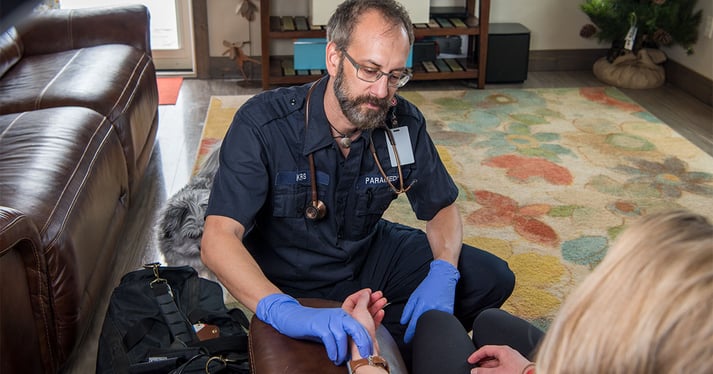Pulsara Around the World - February 2026
January Recap The start of 2026 was on the slow side for our events schedule, with our team heading to the Florida Fire & EMS Conference, the...
2 min read
 Team Pulsara
:
Apr 19, 2021
Team Pulsara
:
Apr 19, 2021

EDITOR'S NOTE: Special thanks to Kinsie Clarkson (Pulsara's Product Marketing Specialist, 2020-2025) for writing today's blog post. You can connect with her on LinkedIn.
__
With the signing of the American Rescue Plan Act of 2021 on March 11th, CMS will now be allowed to reimburse ambulance services for treating patients in place during the public health emergency caused by the COVID-19 pandemic.
The measure comes in response to the widespread need for treatment-in-place caused by the pandemic. As hospitals reached capacity and it became clear that not every patient needed transport to the emergency room, many EMS agencies were directed to render services to patients in their homes, avoiding transport where possible. Traditionally, EMS has only been reimbursed for transporting patients to the hospital.
Rob Lawrence, director of strategic implementation of PRO EMS and executive director of the California Ambulance Association, described the impact of the measure: "Specifically, this waiver would allow CMS to pay for ground ambulance services furnished in response to a 911 call (or equivalent in areas without 911) in cases where a patient was not transported but was instead treated in place in accordance with community-wide EMS protocols."

This is a great stride forward for EMS. As Matt Zavadsky, MS-HSA, EMT, the chief strategic integration officer for MedStar Mobile Healthcare and immediate past president of NAEMT, recently noted, “To some extent, this is earth-shattering in that for the first time, CMS has been instructed by our elected officials in Congress to give EMS reimbursement for essentially treatment and no transport.”
However, this is only the first step toward making reimbursement for treatment in place a reality. According to the EMS industry law firm Page, Wolfberg & Wirth, two things will need to happen before ambulance services can be reimbursed for treatment in place:
1. CMS will need to exercise this newly granted public health emergency waiver authority. Though there is no guarantee that they will do so, CMS has implemented all other waivers authorized by Congress under the law during the pandemic so far.
2. The language of the act requires that EMS agencies have community-wide EMS protocols in place that dictate when treatment in place is considered an appropriate alternative to transporting patients to the hospital.
If these protocols don't already exist in your community, Page, Wolfberg & Wirth recommend working with your system's medical director to develop them.

Before moving forward, CMS will likely want to see evidence of the scope and documentation of services provided by ambulance services during the pandemic while under local protocols that prohibited transporting certain patients to the hospital. The American Ambulance Association is currently conducting a survey designed to provide just that, based around the following question:
“Did your organization experience restrictions on being able to transport certain patients to any approved Medicare destination during the pandemic that resulted in your company providing healthcare services to the patient but not transporting him/her?”
If you'd like to participate, you can access the survey here.
Once this information has been collected and established, says Lawrence, the next step will be using it to convince CMS to provide the waiver. "Armed with the necessary information, the task at hand is then to lobby, perhaps all contribute to a letter-writing call to action, and ask that CMS provide the waiver for both future and retrospective treatment where transport would be otherwise indicated, but protocols indicate this need not occur."
You can find the relevant text of the law here. For more information on the new measure and what it could mean for your agency, check out What the American Rescue Plan Act of 2021 Means for Treatment and Transport Reimbursement Post-COVID-19.
Did your organization experience restrictions on being able to transport certain patients during the pandemic? Participate in the American Ambulance Association's survey here.
 During time-sensitive emergencies, sharing data between EMS and the hospital is a vital part of patient care. But does HIPAA allow hospitals to share data with EMS? The answer might surprise you.
During time-sensitive emergencies, sharing data between EMS and the hospital is a vital part of patient care. But does HIPAA allow hospitals to share data with EMS? The answer might surprise you.

January Recap The start of 2026 was on the slow side for our events schedule, with our team heading to the Florida Fire & EMS Conference, the...

Recent research shows how Pulsara was successfully leveraged to connect more than 6,000 COVID-19 patients to monoclonal antibody infusion centers via...

At Pulsara, it's our privilege to help serve the people who serve people, and we're always excited to see what they're up to. From large-scale...